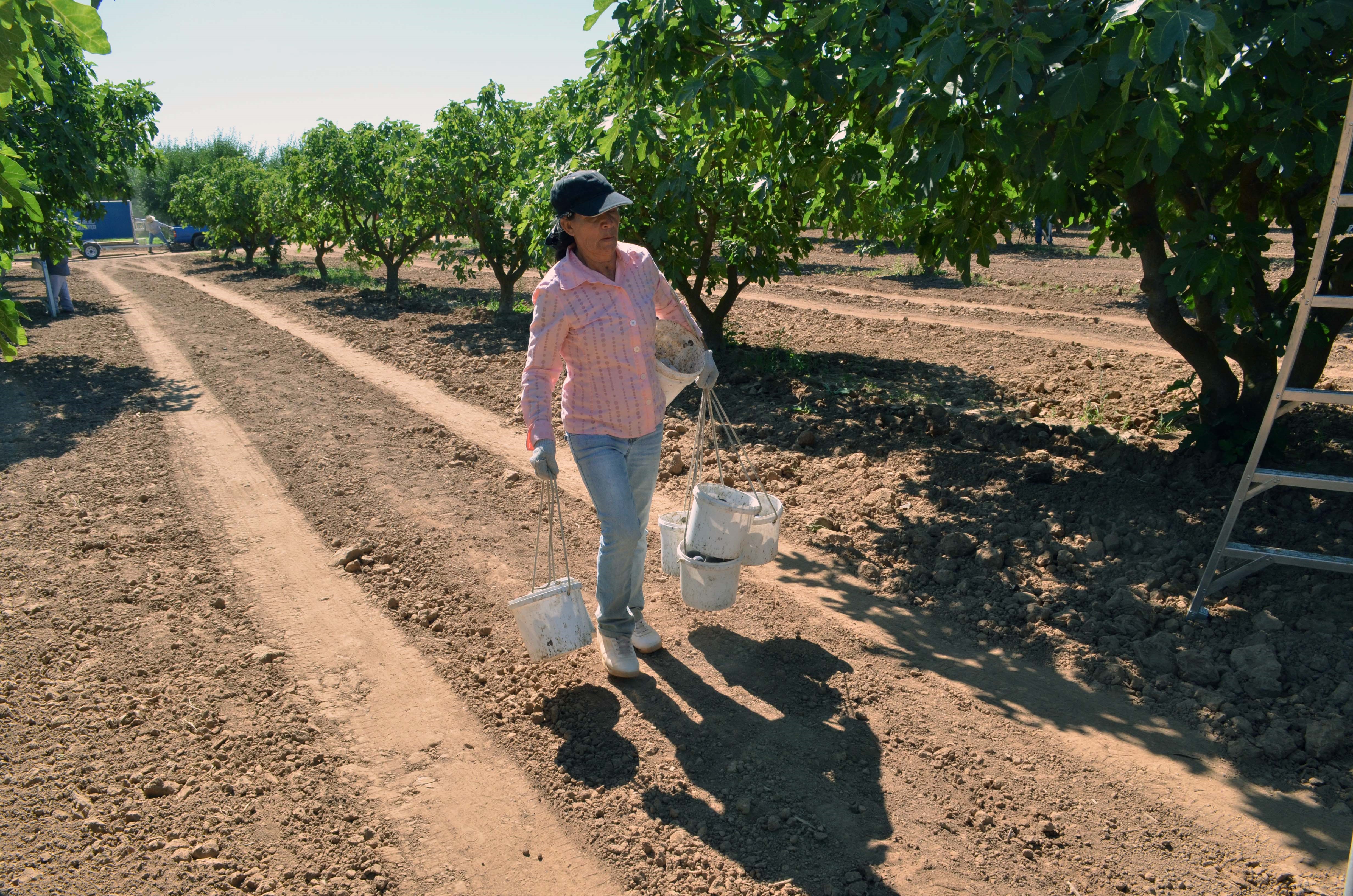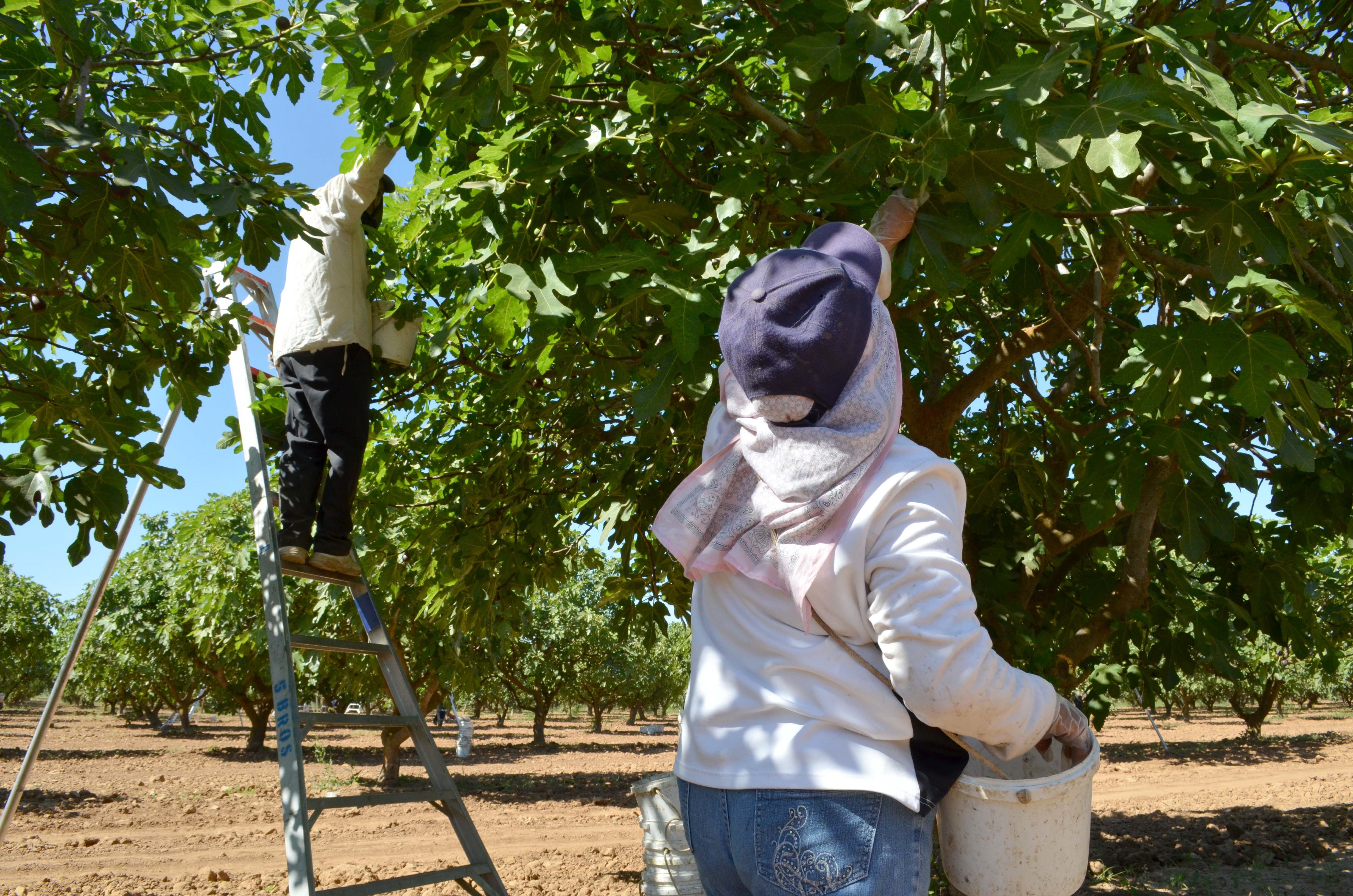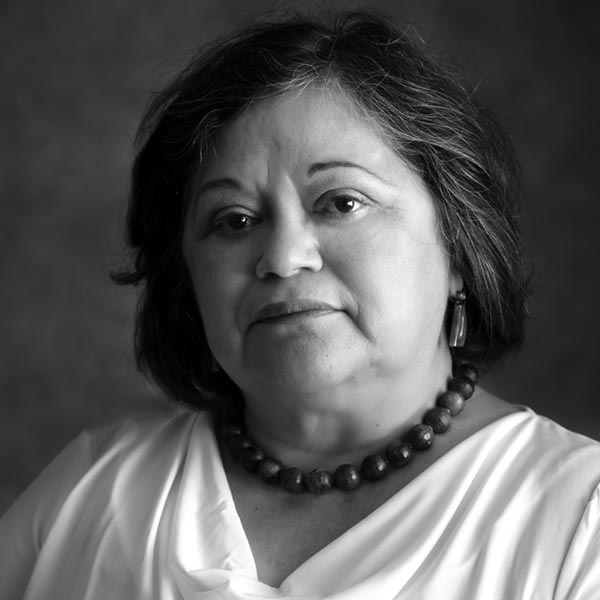
Elvira, a farmworker, works to harvest figs in Madera, California. Photo: Eduardo Stanley
California’s San Joaquin Valley is the most productive agricultural region in the world, where more than 250 crops are cultivated. For decades, the agricultural industry has attracted immigrants from all over the globe to work in the Valley. During harvest season—from March to September—it’s estimated that there are over 300,000 people working local farms and growing food to feed people across the country.
Agriculture is a multibillion industry in San Joaquin. But that wealth comes at a high cost. Industrial agribusiness is a leading contributor to the climate crisis. It also fuels economic inequality in farmworker communities in the Valley and beyond.
While farmworkers have been deemed “essential”—especially during the pandemic—they are often treated as disposable by their employers and the government. They are paid wages that keep them in poverty. Many live in unsafe, unsanitary housing and labor in harsh, inhumane conditions. Work accidents are frequent, and a large percentage of farmworkers develop long-term work-related ailments and diseases. Despite their contribution to the economy, undocumented farmworkers cannot collect Social Security because of their immigration (even though they pay for it) or unemployment insurance.
Over the past decade, rapid climate change has exacerbated conditions for local farmworkers. Many are forced to continue to work even in the fields when temperatures exceed 100 degrees—or when exposed to smog during fire season.
Since 1955, AFSC has worked with farmworkers and other community members in the San Joaquin Valley. In 1998, we founded the Pan Valley Institute (PVI) to strengthen the leadership capacity and foster civic engagement of immigrants. Over more than 20 years since, we have supported community members in organizing and advocating for the rights. PVI’s work has responded to the Valley’s evolving demographic landscape, including the arrival of ethnically and linguistically diverse Indigenous migrants from Mexico and Central America, Hmong and Cambodian refugees from Southeast Asia, and more recently, refugee families arriving from Iraq, Palestine, Syria, and Iran. Our work is cross-generational, specifically emphasizing women, youth, and Indigenous populations.

Rapid climate change has exacerbated already harsh conditions that farmworkers face, including higher temperatures. Photo: Eduardo Stanley
Today, PVI continues to stand with farmworkers and other communities as they face the impacts of climate change. This month, we are hosting “Salt of the Earth,” a national encuentro (gathering) to discuss strategies to build climate, food, and land justice for all. This is the first time in Central Valley history that farmers, farmworkers, cultural organizers, academics, and climate, food, and land justice activists are coming together to share experiences and exchange ideas. We will amplify each other's voices, support one another in solidarity, and work together to create a different Central Valley that is more just for our people and our land—and where all who live here can feel a true sense of belonging and opportunity.
The need to ensure a more just, sustainable future for all has never been greater. In the months leading up to the encuentro, the host city for our gathering—Madera—saw the closure of its only community hospital. That loss has left tens of thousands of residents—predominantly low-income, immigrant farmworker families—without emergency and medical services.
The closure is just one example of the social inequity farmworker communities face. It’s also a reminder of why it’s important that we bring gatherings like ours directly to the neighborhoods of farmworker communities. Our gathering will provide safe, welcoming spaces for all to discuss pressing issues like limited health care access, low wages, and job insecurity—and how we can collectively work to address them.
Our gathering is part of our long-term work to create a more inclusive socio-political landscape in the Central Valley, where the voices of immigrants and refugees are heard in the halls of power. Where social exclusion and racism are replaced by a culture that respects and values cultural and ethnic diversity and immigrants’ contributions. With our community partners and allies, PVI is committed to working for a more just and diversified economy that is not solely driven by agri-business but provides economic security opportunities for all. In the next 10 years, we hope to create the first-ever immigrant and refugee-led popular education center in California’s Central Valley.
Our national encuentro is a major step toward these goals. Today it is time to act and support food production systems that care for the land, water, and climate and treat farmworkers with respect and dignity we all deserve. Now more than ever, creating spaces for building solidarity and reimagining a world of climate and economic justice is critical. We hope our gathering will lead us to concrete actions we can all take toward a better future for all.
Read more about “Salt of the Earth,” a national encuentro, which takes place April 20-22, 2023 in Madera, California.
